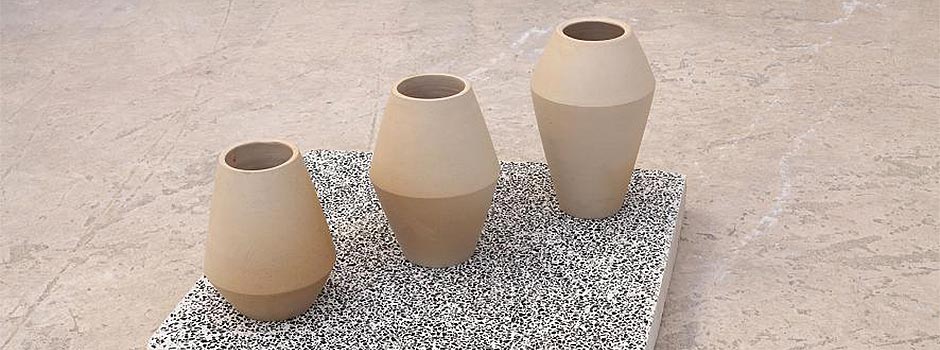
DUBAI DESIGN WEEK (OCTOBER 24-29) Dubai Design Week Showcases Stand-Out Design From MENASA Region with Return of Popular Abwab Exhibit
Sep 22, 2016 Art Event

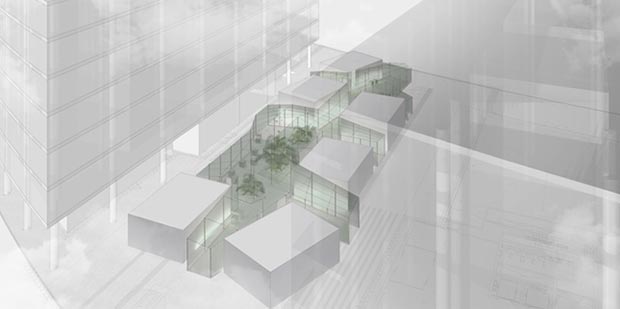 Aerial view of the Abwab pavilions / Courtesy of Dubai Design Week
Aerial view of the Abwab pavilions / Courtesy of Dubai Design Week
Dubai Design Week’s popular exhibition Abwab will return to this year’s program, festival. A showcase of emerging and established creative talent from the Middle East, North Africa and South Asia (MENASA) region, Abwab (‘doors’ in Arabic) will showcase entirely new work from designers and studios from Algeria, Bahrain, India, Iraq, Palestine and the United Arab Emirates.
Rawan Kashkoush, Creative Director of Abwab says: "The Abwab pavilions are a microcosm of diversity each year, showcasing design in a format that brings the region closer together. Sat side by side, the ideas of each of the countries are emphasised. The exhibitions tell of their origins more clearly when we are able to read them all at once."
Abwab is part of Dubai Design Week held in partnership with Dubai Design District (d3) and under the Patronage of Her Highness Sheikha Latifa bint Mohammed bin Rashid Al Maktoum, Vice-Chairman of Dubai Culture & Arts Authority (Dubai Culture). Dubai Design Week is also supported by Dubai Culture, Dubai Design & Fashion Council, and Audi.
Located within the walkways of d3, Abwab will be housed in a pavilion cluster designed by architects Meitha Al Mazrooi, Hatem Hatem and Fortuné Penniman of UAE-based architectural practice A Hypothetical Office. Integrated within the d3 site, the pavilions will be made from a re-appropriated greenhouse structure to form a ‘housh’ or courtyard, a playful nod to Arab neighborhood nostalgia that is both enclosed and permeable. Paths of filtered light and shady, canopied public spaces allow for access and pockets to converse in –the negative space acts as a harbour and gathering space for visitors.
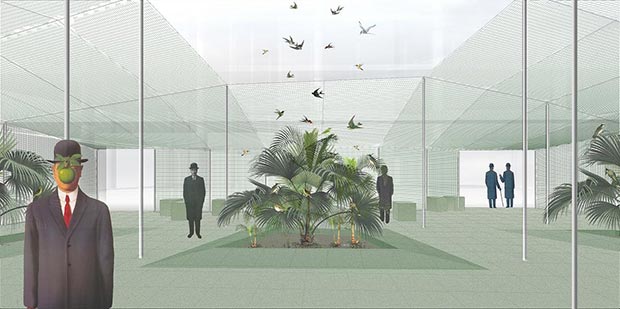 Abwab pavilion architecture, AHO, Interior view / Courtesy of Dubai Design Week
Abwab pavilion architecture, AHO, Interior view / Courtesy of Dubai Design Week
Hatem Hatem from A Hypothetical Office says: "The structural language of the Abwab pavilions will be composed of faceted surfaces that provide intimate enclosures, lit by lighting specialists Acdc. The surface material is a form of woven plastic mesh that allows for light and transparency, enclosed between a field of columns and delimited by reclaimed rubber flooring donated by Bee’ah."
Mohammad Saeed Al Shehhi, Chief Operations Officer of d3, said: "One of our ambitions at d3 is to fully enable creative potential and our flexible spaces here at d3 allow us to offer a platform for artists and designers to showcase their work within a suitable infrastructure. In working with Downtown Design and Hypothetical, we are proud to establish the Abwab series and help champion some of the best examples of design from the MENASA region."
The Algeria pavilion invites visitors of all ages to become musicians, performing improvised beats in time to a subtle soundtrack using colourful, contemporary Algerian design-drums. Curator Hellal Zoubir, an established painter and designer, has commissioned graphic designers Moura Krinah and Walid Bouchouchi, interior designer Souad Delmi Bouras and product designer Mohamed Ourrad to create a visual and reflective space defined by large graphic posters and mirrored floors.
The vast quantity of millennia-old artefacts found in archaeological sites throughout Bahrainis testament to the island’s ancient art of pottery. The Bahrain Authority for Culture and Antiquities has appointed interdisciplinary designer Othman Khunji and architect Maitham Al Mubarak to design an accessible and interactive interface and video installation to teach visitors the value and heritage of this largely forgotten, traditional craft.
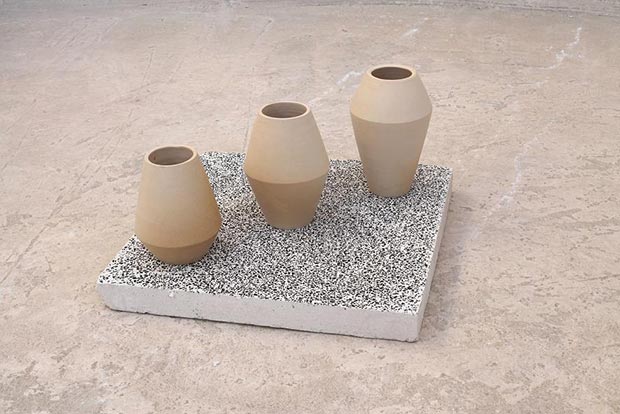 Abwab Bahrain, Unearthing / Courtesy of Dubai Design Week
Abwab Bahrain, Unearthing / Courtesy of Dubai Design Week
Architect/designer/cultural researcher Rand Abdul Jabbar and designer Hozan Zangana also turn to history in the co-curated Iraq pavilion with elegant, abstract forms that reference ancient architecture, sculpture, calligraphy and poetry.
Olive wood carving represents a third of the artisanal industry in Bethlehem, but cheap imports and mass customization are threatening this tradition which has its roots in the 16th century. French-Palestinian architects Elias Anastas and Yousef Anastas have created an innovative olive wood structure in the Palestine pavilion that celebrates the imperfections of the olive wood master carvers’ craft.
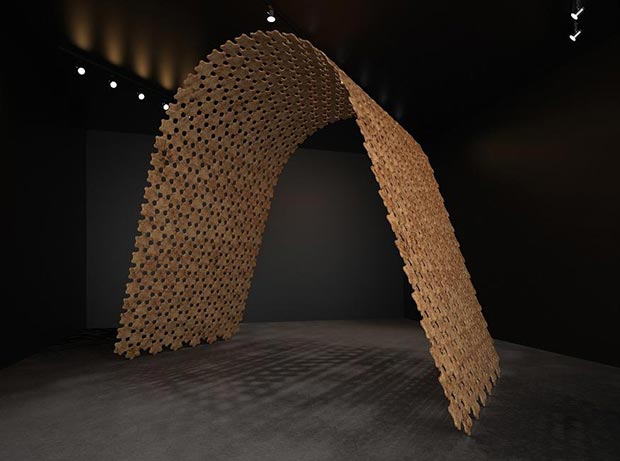 Abwab Palestine, Unearthing / Courtesy of Dubai Design Week
Abwab Palestine, Unearthing / Courtesy of Dubai Design Week
In the United Arab Emirates pavilion, curator and multidisciplinary designer Salem Al-Qassimi and Maryam Al Qassimi draw inspiration from the ubiquitous cafeteria’s that have become an integral element of the Emirati culture. As a cultural concoction, the cafeteria isa mélange of disparate tastes, visuals, and ideas coming together to form a multicultural singularity. The pavilion titled Afaaq Al Mustaqbal, attempts to highlight the many layers of this cultural phenomenon.
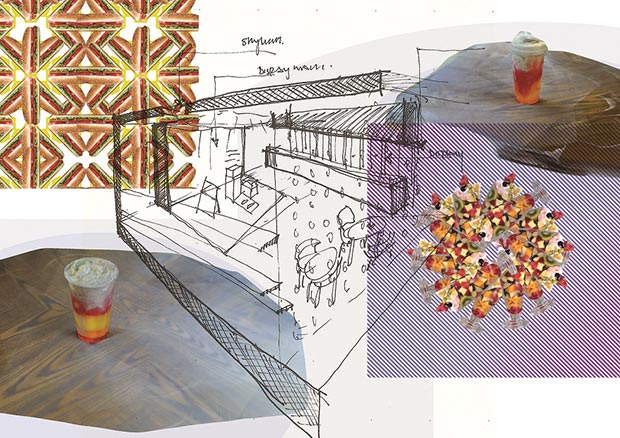 Abwab UAE, The Future Cafeteria, Sketch Collage / Courtesy of Dubai Design Week
Abwab UAE, The Future Cafeteria, Sketch Collage / Courtesy of Dubai Design Week
India has been producing world-class encaustic cement floor tiles for almost a century and to reference this artisanal history, multimedia artist duo Thukral & Tagra have built an interactive ‘Memoir Bar’. Visitors can write down a memory or emotion, record it in their own hand-made, hexagonal floor tile and add it to this ‘library of memories’ where they can deposit, transfer or exchange it for another one.
Comments
Add a comment